By Jana Semeniuk
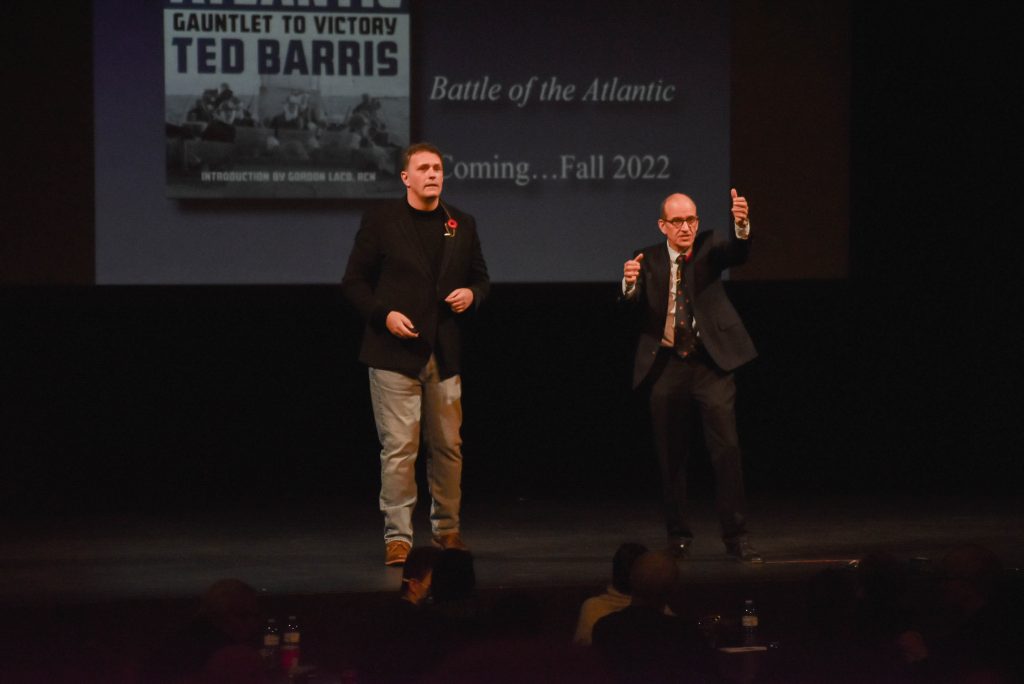
Canadian military historians Ted Barris and David O’Keefe teamed up to deliver an evening chock full of engaging stories, pictures, and film clips at Festival Place on Nov. 12 highlighting Canada’s role in the liberation of the Dutch during the second world war as told in Barris’ book Days of Victory. Their story telling brought life back into Canadian heroes such as Calgarian Joe English who, instead of going home after a full tour of 30 operations over enemy territory, volunteered to fly with his crew dropping food from their Lancaster bombers to starving Dutch families.
After wrapping up their presentation, Barris looked thoughtfully at the sea of more than 300 faces, asking if anyone had questions, when a small hand shot up from the crowd.
12-year-old Chase Mardres stood up, confidently asking Barris what the most emotional part for him was in writing Days of Victory.
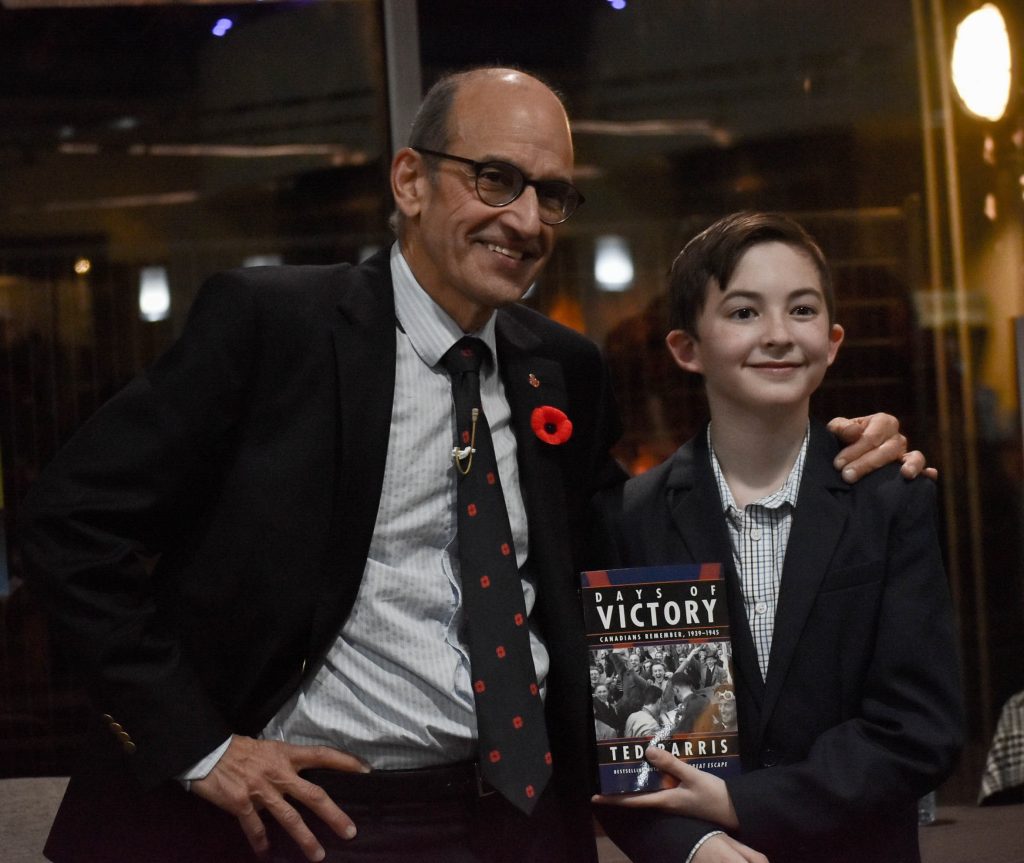
“I m not sure you will find my answer satisfying, but I would have to say it was co-authoring this book with my father, Alex Barris, all of those years ago.” he said. “We thought we’d time the book for publication on the 50th anniversary of VE Day (Victory-in-Europe Day) May 8, 1995. We talked to scores of soldiers, sailors, airmen, women in the services, reporters and correspondents, former prisoners-of-war, medical personnel, artillery crews, padres, and entertainers. We each came back with hours and hours of audio tape, piles of files and newspaper clippings (the Internet was not available to us back then) and locked ourselves in an office to write the book.
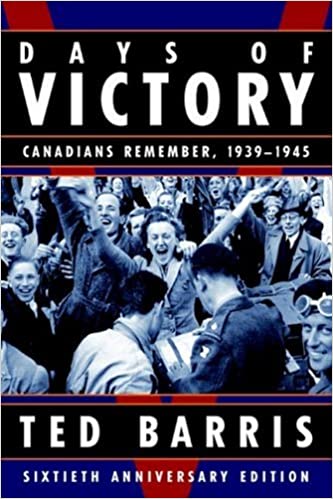
But the ultimate emotional thrill had to be seeing the first edition of Days of Victory on May 8, 1995, the 50th anniversary of the end of WWII, on Canada’s Non-Fiction Bestsellers List, and our names side-by-side as co-authors in the number one spot: Alex Barris and Ted Barris. It was an honour to share the moment with my father, my mentor, my best friend.”
Since then, Barris has included updated material and reprinted the book as a paperback for the first time.
Mardres, who was among the youngest fans at Festival Place, said he first became interested in military history after watching a movie.
“I saw the movie ‘Hacksaw Ridge’ when I was eight years old and I’ve been interested ever since,” he said. Mardres attended the event with both of his parents who are also veterans.
The diverse crowd gathered to not only partake in the compelling stories, but to also admire the many pieces of military equipment on display in the lobby, courtesy of collector and veteran Claude Villeneuve, in addition to engaging in a book signing with both Barris and O’Keefe.
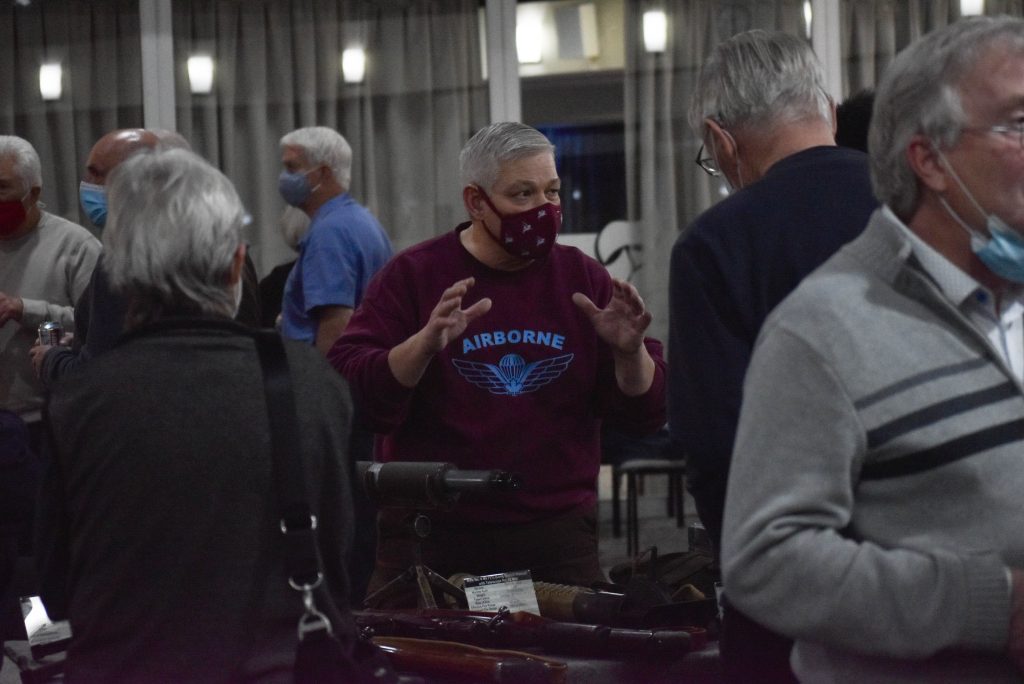
The opportunity to meet with the authors, as well as artifact collectors and discuss historical details drew many enthusiasts.
“I first met Ted in Normandy in 2019 at the 75th anniversary for D-Day.” said local resident and author Don Levers. “To be able to come out and see him at this kind of a gathering is absolutely terrific.”
While many of the participants had personal connections to Canada’s military history, others, including Fort Saskatchewan resident Sandy Lichuk, 52, came to satisfy their own curiosity and fascination with the era.
“I have no connection to the war, but the history and all of the events that transpired in that time have always fascinated me since I was a child.” she said. “I had an opportunity tonight to speak with David O’Keefe. His energy was great, and I just love listening to the stories.”
O’Keefe, a best-selling Canadian author who also wrote and co-created History Channel’s program War Junk, not only told stories from his book Seven Days in Hell around Canada’s Black Watch, he also shared a personal story which he said first inspired his love of military history.
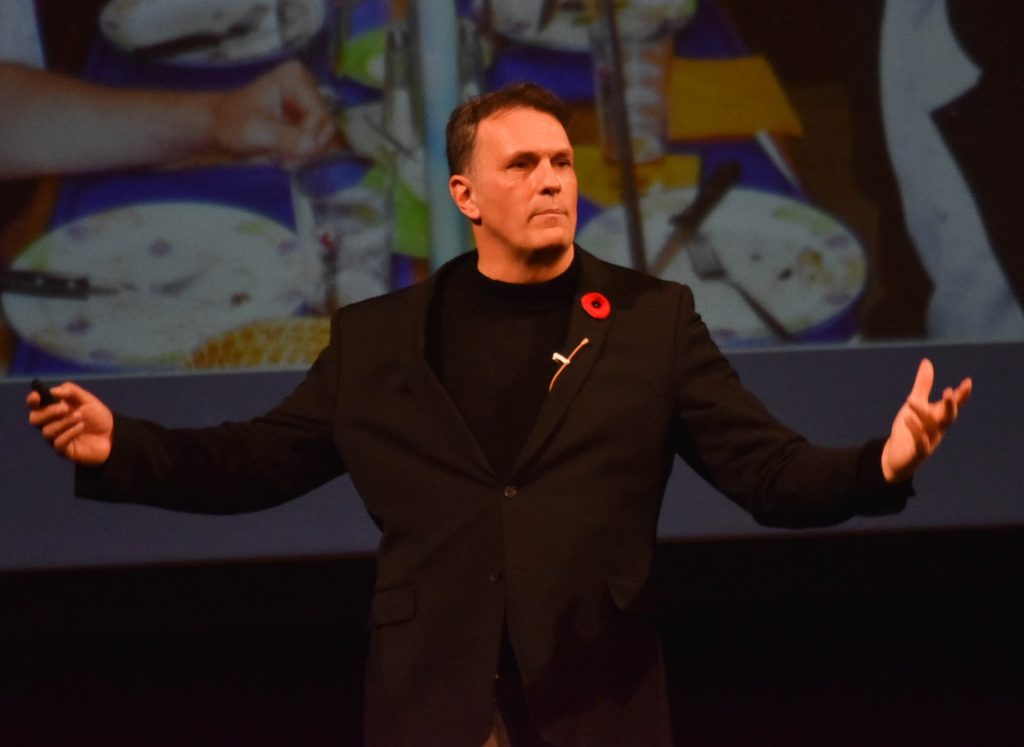
“I always trace it back to a story I heard when I was very young. I caution it’s a story, but the feels in it are universal.” he said. “And it is something that has really helped shape me.”
O’Keefe went onto tell the story of Bruce Pringle and Frank Power, two best friends, who met during the first world war and fought together, surviving four years from 1914 to 1918 when soldiers had a less than 25 per cent chance of doing so. Unfortunately, Pringle was killed when he stepped on a grenade sending a piece of shrapnel through his own body and lodging into the forehead of his best friend. While Power survived, the shrapnel remained lodged in his forehead for the rest of his life.
“When (Power’s) grandchildren were young, he would take them on his knee and tell them this story then he would take their finger and he would put it up to the shrapnel that was still layered in his head and connect them with his best friend.” said O’Keefe. “He had 14 grandchildren and I was number 13.”
Meanwhile, emcee for the evening was local veteran and musician Tim Isberg, whose 2019 song “Yesterday” was inspired from an interview conducted by Barris.
“A number of years ago, Ted interviewed a veteran named Chuck Ross” said Isberg. Ted asked him how he was able to remember so much of the details from the war and Chuck said “Well for you it might be history but for me it was yesterday. I wanted to write a song around that line.”
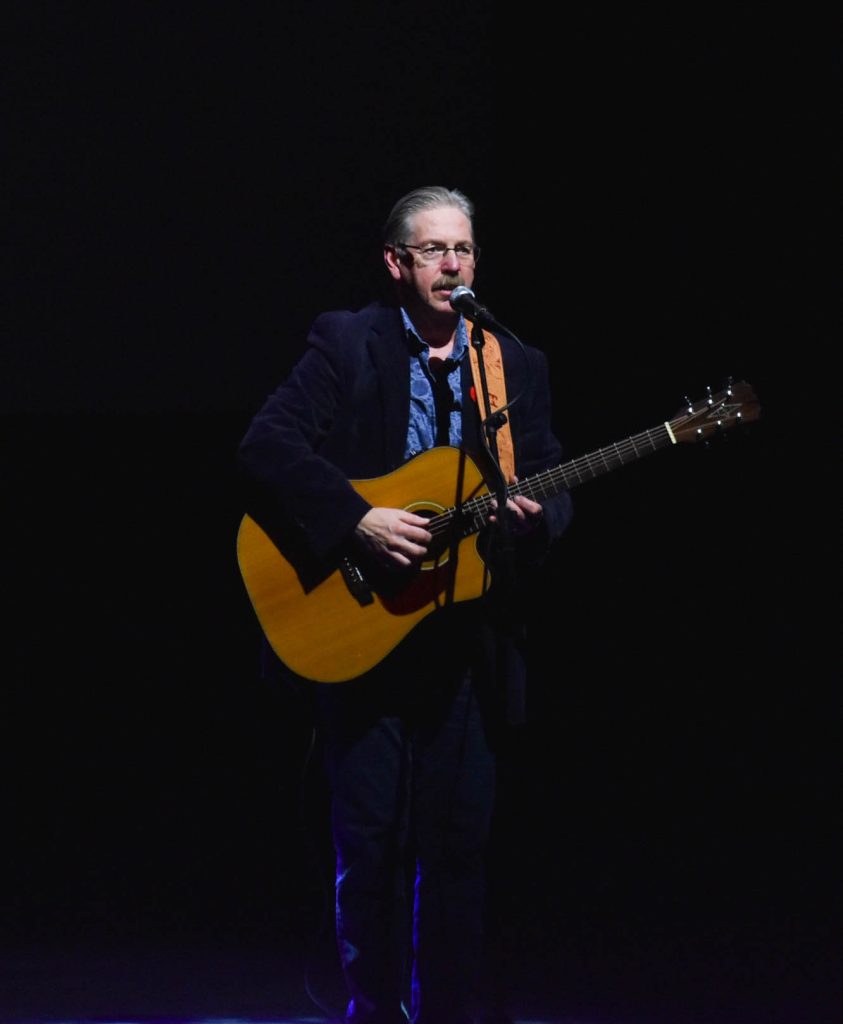
Since then, Isberg’s song has been made available on his second album Running on the Edge, appeared on YouTube and social media platforms in addition to being played at Remembrance Day ceremonies. It was played during a ceremony at Millenium place unbeknownst to Isberg who was in the crowd at the time.
“The year before COVID they played the video with my song during the Remembrance Day ceremony at Millenium place in front of a couple of thousand people and I was in the crowd. I had no idea they were going to do that” he said. “It was quite an honor.”
In addition to introducing Barris and O’Keefe onstage, Isberg played his guitar and sang the deeply moving song during intermission to the crowd’s delight.
Over the years, Barris has held six military story telling events at Festival Place with his 2019 event around the story of Dieppe being his first partnering with O’Keefe. Barris said he was grateful for their in-person gathering this year after a planned event for last year was cancelled due to the pandemic
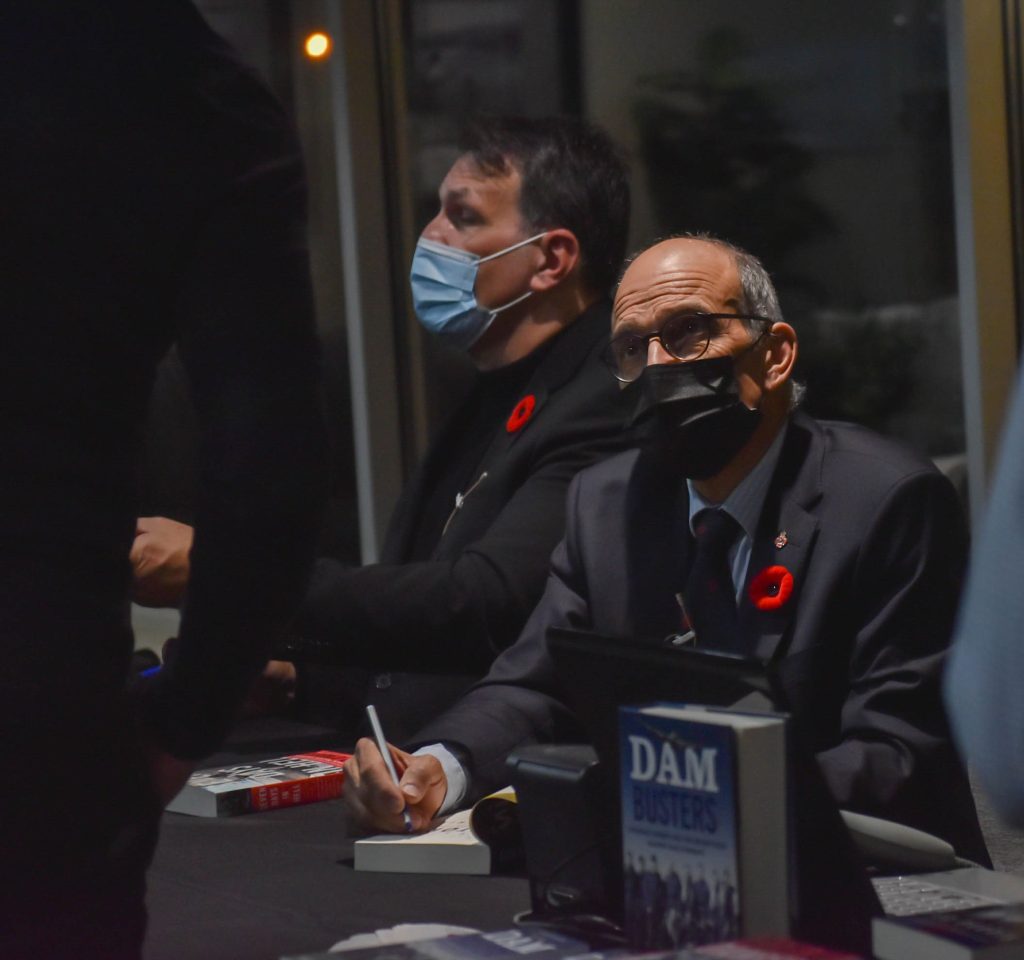
“I have grown to hate zoom because it is so antiseptic. You cannot get the dynamisms and the energy through the screen. The energy from the audience is hugely motivating during these events” he said.
O’Keefe added that he was happy to see so many people coming out to the event.
“I wasn’t expecting such a big crowd” he said. “We had 334 people come. It was wonderful to be able to do this.”
Barris hopes to return to Festival Place next year after the summer publication of his 20th book.